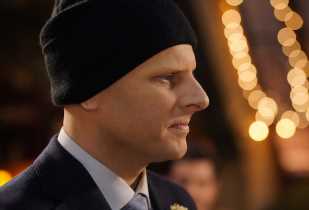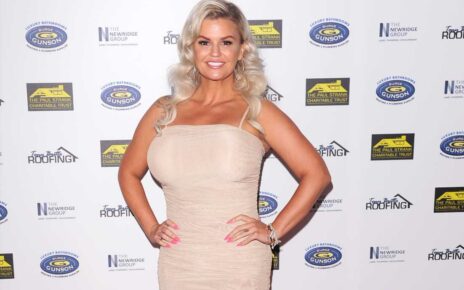This story contains spoilers from A Million Little Things‘ series finale. Proceed accordingly.
A Million Little Things broke its audience’s hearts into a million little pieces Wednesday when Gary took his last breath during the show’s final episode ever.
Though James Roday Rodriguez‘s character had been diagnosed with incurable lung cancer at the start of the season, the disease wasn’t what killed him. Instead, Gary chose assisted suicide, borne of a desire to die with dignity. His shocked friends initially fought the idea but eventually helped him get everything he needed, and then they gathered for a memorial dinner while Maggie handed her husband the drug-laced tea that ended his life. Then, an episode-ending time jump gave us a glimpse of how everyone was doing 15 years later. (Read a full recap.)
Once we recovered from the emotionally gutting hour, TVLine chatted with Rodriguez, Nash and executive producer Terrence Coli. In separate interviews Monday, the men discussed what went into the decision behind Gary’s decision. Read on to hear their thoughts.
TVLINE | James, you co-wrote this episode with DJ. Why did you want to take on that duty, in addition to acting, for the last hurrah?
JAMES RODAY RODRIGUEZ | I didn’t. I was approached by DJ pretty late in the game, and he was like, “Hey, man, I think we should do this together.” And at that point, after however many episodes we had shot and all the stuff we had been through, it felt kind of like a Butch and Sundance situation that I needed to say yes to. We have known that this is how the show was going to end for a long time… So, for us, it was like seeing through something that we had been talking about on and off for four seasons. Doing it together, once I thought about it, made some sense. It was also a chance for us to, I guess, reconcile and process the last five years, give each other a shoulder squeeze and go out like people that had grown and evolved.
 TVLINE | When you say that you knew how this was going to end for a while: You knew specifically that Gary was going to make the choice to end his life on his terms?
TVLINE | When you say that you knew how this was going to end for a while: You knew specifically that Gary was going to make the choice to end his life on his terms?
RODRIGUEZ | Yeah. It was a concept that we both felt was absolutely dependent on whether or not we earned it over four seasons, and if we hadn’t felt like that, then we wouldn’t have done it. Whether you love it or hate-watch it or whatever your relationship is with it, for a network show we’ve tried really hard to reflect the human experience as authentically as we can. And the truth is we had two people that were suffering from this horrible disease, and one of them beat it, and the way that we know that life works is that a lot of people don’t get that lucky. So it felt like, in order to balance the scales and reflect the two different experiences that people could have with this rattlesnake of a disease, we had to go the other way.
DJ NASH | I knew from the beginning I wanted to have a series start with a suicide that should not have happened and end with assisted suicide, which was the humane thing to happen. And I love the idea of a series following two friends, Rome and Gary, who both have diseases, and one is able to beat their disease and one is not. So, that was always the plan. I think I told very few people, certainly no actors, and then at one point I told James because there’s a couple things that we were doing, story-wise, that he was pitching that were really smart, but I needed to let him know I didn’t want to do that yet. I let him in on that, and then it became this sort of rite of passage whenever the writers’ room started.
TERRENCE COLI | I started in Season 3, and I remember we were on Zoom, early days of the pandemic… You laid it out, and it was remarkably close to the episode that just aired as the finale. Even then, I was like “That’s what we have to do…” So, we stuck to the plan.
TVLINE | Let’s talk about Maggie not getting clued in until the plan has been put into motion. Although I understand it from a story perspective, as a wife, I’m like, “She’s his partner! She should’ve been in on this from the beginning!” Talk to me about why you decided that it would be the guys dealing with this until the last minute.
NASH | It’s a really great question. Candidly, when I saw the first cut… I was like, “Ooh, this feels a little too much like this was put upon Maggie and we took her power away.” And I found an ADR line that we put in [during post-production] that really kind of changes the effect of that. But I think a couple things — It was only plan Z. It wasn’t the plan. If you look back at the episode with the birthday party, Maggie needed Gary to beat this, and the whole reason he was going to go to Mexico was so that she could feel like “I did everything else.” I think having her know about this other plan would’ve been off the table for her.
COLI | And I’d just add to that: I think it would’ve affected the time that they had left together, right? It would have been a constant thought in Maggie’s mind for the time that they did have left, and I think Gary knew that he needed his friends, who could compartmentalize it a little bit in a way that perhaps Maggie could not.
 TVLINE | James, was Gary’s ultimate choice in your head all season, as you were performing? When, in your mind, does he come to the decision?
TVLINE | James, was Gary’s ultimate choice in your head all season, as you were performing? When, in your mind, does he come to the decision?
RODRIGUEZ | I personally tried not to start thinking about it until the end of Episode 11. I think Gary’s responsibility for both his wife and his baby and all of his friends was to remain as positive and hopeful as possible. When he coughs up blood at the end of 11 is when he realizes that things probably aren’t going to go his way. So, that’s when for me, I started sort of letting the mortal coil stuff sort of seep in for sure.
TVLINE | Whose idea was it to have Gary unable to communicate verbally at the end?
RODRIGUEZ | That was definitely DJ, but the reason for it is two-fold. One, we have this consultant who’s been with us from the very, very beginning and she laid out all the things that could happen with someone with Stage IV lung cancer, and that was one of the things that she said is possible. And then in order to sell the death-with-dignity thing, we needed to check certain boxes so that you don’t have everybody watching going, “Well, he’s fine. Like, why wouldn’t he want a few more days or a few more weeks with the most important people in his life, you know, if he can still do this, this, this, or this?” So, it was really about threading the needle and trying to find, like, what is the balance? Like, if someone says they don’t want to be confined to a bed with everybody waiting for them to take their last breath, what does the tier above that actually look like?

TVLINE | What was the toughest part of the episode for you to get through shooting?
RODRIGUEZ | Honestly, watching my co-star Allison Miller have to carry the emotional burden of everything that was happening. To be completely honest with you, I feel like I got off easy comparatively — except for all the time I had to spend in the makeup chair.
TVLINE | How many hours was that?
RODRIGUEZ | Well, it would’ve been worse if I hadn’t shaved my head, which is why the first thing I said was, “I’m shaving my head.” But also I just felt like, I don’t know, as much as we can as actors, it’s like, don’t be a fraud. You know what people go through when this happens. Like, they don’t have bald caps on. So shave your head… But I feel like, Allison really did have to carry the water. And she’s such a good, honest actress that I knew she was suffering, and that was hard to watch.
TVLINE | DJ, I know the character of Maggie was partly inspired by your aunt Madi, who died of cancer. You’ve talked about how you wanted Maggie to survive because Madi didn’t. Was there ever a temptation to pull the ultimate TV happy ending and have things work out well for Gary, as well?
NASH | The answer’s no, but… We were really aware that people are invested as though [the characters] were real and that we had a responsibility, to not give everyone a happy ending, but to make sure everyone was OK. And so that is why, in the premiere of the season, we made it very clear that one day Gary will die from cancer… He accepts that. He is OK with it. Maggie just wasn’t, and Maggie represents the fan group, you know, the same way she represents the viewers in the pilot, where she’s the person who’s introducing us to the group of friends. So, Act 6 of the finale is all about that. We could’ve ended the series with the dog moan [Laughs] — no, we couldn’t have — but we wanted everyone to see that Javi’s okay. Maggie’s okay. They’re all moving on, and just like the lesson I learned when I lost my dad, your relationship with your father isn’t over. It just changes.
What did you think of the finale? Sound off in the comments!
If you’re thinking about suicide, are worried about a friend or loved one, or would like emotional support, dial “988” for the National Suicide & Crisis Lifeline.
Source: Read Full Article


